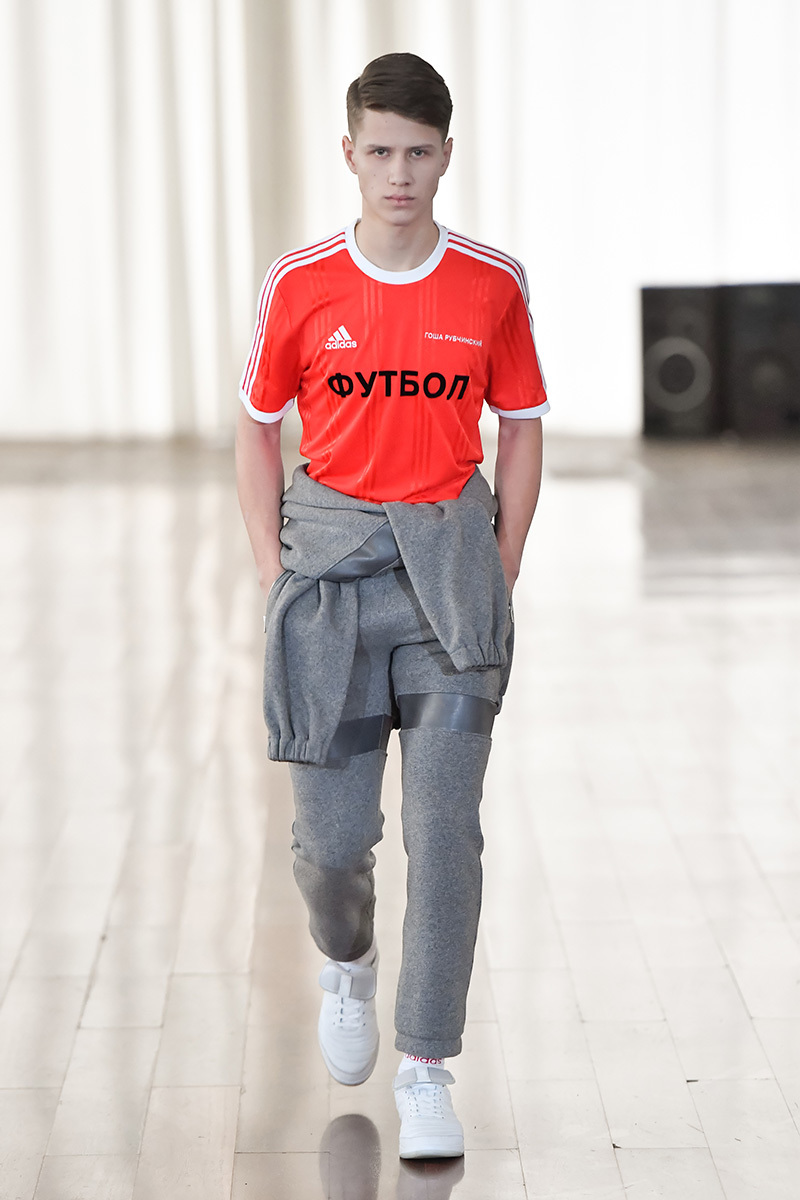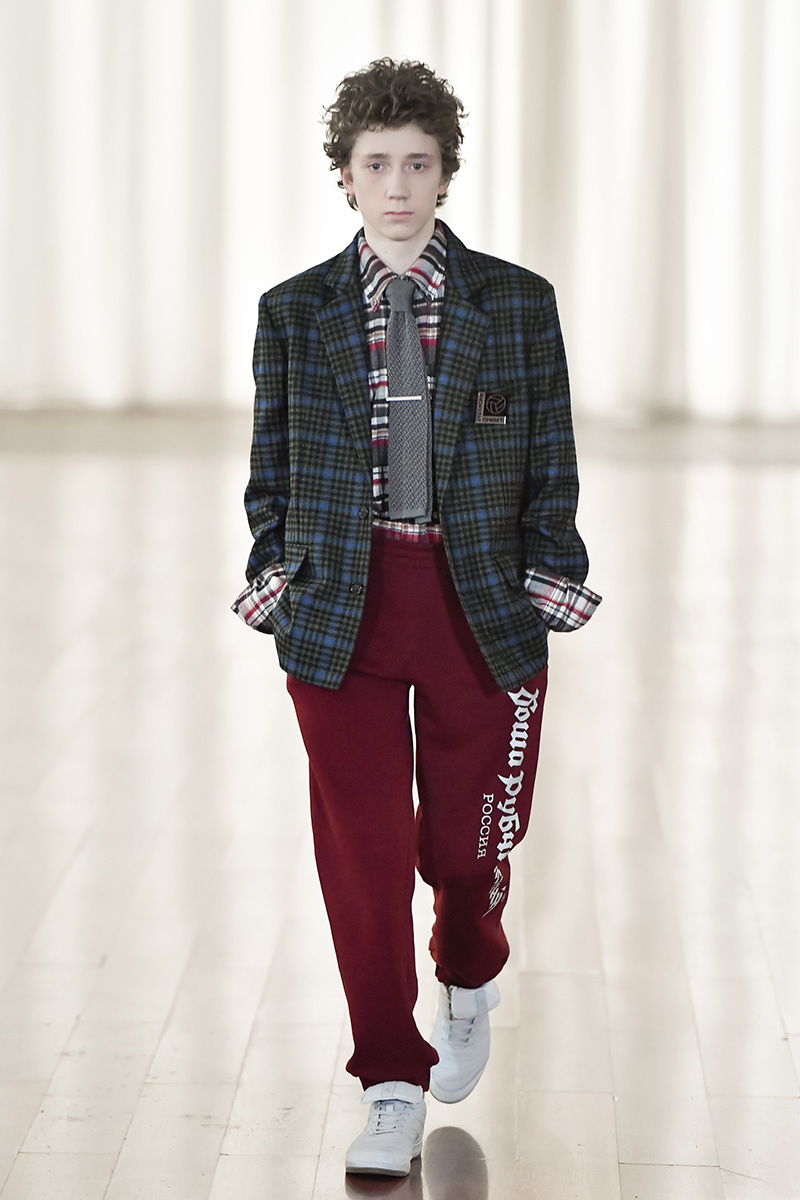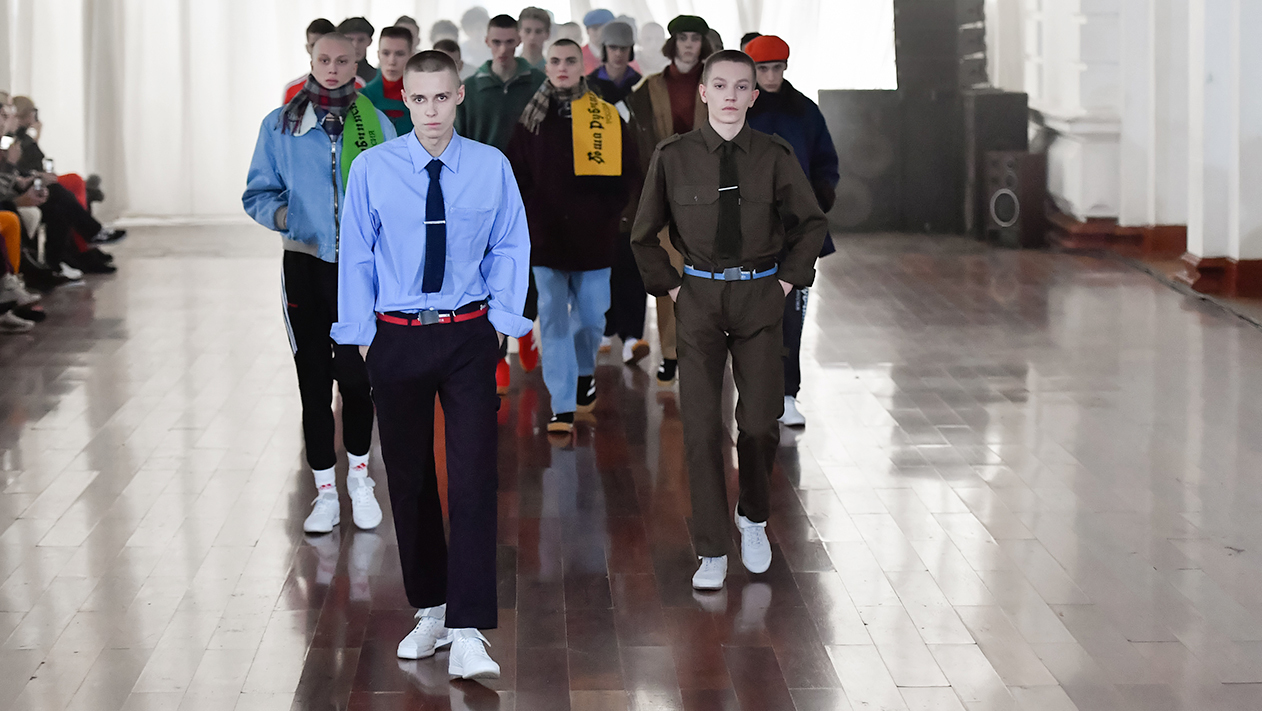You could probably go a lifetime without hearing about Kaliningrad, a Russian enclave on the Baltic coast just north of Poland. Or perhaps you caught the news last November that President Putin had deployed nuclear-capable missiles there effectively moving the reach of his iron fist another 500km closer to the West. “If you think about Russia you think about politics. It’s more interesting for me to invite you here and show you what Russia is rather than showing you in Paris,” Gosha Rubchinskiy said after his fall/winter 17 show in snowy Kaliningrad on Thursday afternoon. Now 32, the Muscovite designer has devoted his eight-year-old streetwear brand to a kind of international enlightenment on the country he knows and loves — a much different Russia than we know from Western media. Following his Italian excursion last summer where he presented perhaps the most politically loaded collection of his career in a Mussolini-era building in Florence, his adventure in Kaliningrad this season was born out of a more unifying spirit.

Bathed in the icy daylight illuminating the pillared 1875 hall of the former Königsberg Stock Exchange on the bank of the frosty Pregolya River, Rubchinskiy based his collection on sportsmanship, marking the impending World Cup hosted by Russia, some of which will take place in Kaliningrad. “I wanted to mix the cultures of English football fans and German sportswear and Russian skate kids altogether,” he explained, referring to his collaboration with Adidas. Before it was occupied by the Soviet Union after World War II, Kaliningrad was Königsberg, a part of Germany since the 13th century when Teutonic Knights settled there. Although it was heavily bombed, the city’s architecture still shows signs of its Prussian past, even if the distinct Eastern European touch added by those practical Soviets now gives you more of an early 80s Christiane F. vibe, in the freezing January cold perhaps by way of a Siberian hamlet. “Our project isn’t just about this season,” noted Rubchinskiy, who had worked on a typically stylish city guide for Kaliningrad with InRussia in anticipation of the football.

“We want to do a few events for the World Cup, and I think it’s the perfect place to start. It’s a small Russian city but at the same time it’s in the middle of Europe. I’d never been and I wanted to see it and learn and invite people here.” Informing the world about Russia has become a kind of mission for the young designer, who showed his collection on a beautiful cast of all-Russian boys and scored it with a soundtrack of each of them talking about their innermost hopes and fears — in their native tongue, of course. Rubchinskiy wanted to take the boys out of their comfort zones and create an experience that wasn’t just personal to himself and his Russian 90s youth nostalgia, but to the boys, too. “One was 23 and the youngest was 15. It’s kids of different ages from different cities speaking about their feelings. The soundtrack, to me, was a portrait of a modern Russian generation.” In their football scarves, granddad tailoring, polite schoolboy tracksuits, and typical British check hats by Stephen Jones, there was an innocent earnestness about the collection, which very much reflected the poetic young men from Moscow with whom Rubchinskiy surrounds himself.

Part of his team, they were all in Kaliningrad for the show, waxing wistful about the designer’s impact on their minds and lives, and the informed and hopeful generation of Russian youth his movement represents. “I like things that unite people: music or football or fashion,” Rubchinskiy mused. “I think there’s a good reason to go somewhere and see places with your own eyes and not on the internet or in newspapers.” The day after even more salacious reports of Russia’s involvement in the world of US President-elect Donald Trump broke — news that they allegedly have damaging footage of him from a Moscow hotel room — the reminder that Russia is more than war-mongering and conspiracy theories seemed as poignant as ever, especially in a time that’s increasingly reflecting a sense of pre-90s Western fear of anything Soviet. “For me, it’s my mission: I’m Russian and I have a voice. I can speak about my country and invite my friends from the international press here,” Rubchinskiy said. “I just want to show my point of view. I don’t want to teach people. I only want to show them what I like. If you like it, we can share.”

His show was the season’s absolute highlight so far, and testament to the fact that in these times of endless fashion weeks and daily shows in tenfold, there’s a lot to be said for giving a collection room to breathe. In the virtually remote surroundings of Kaliningrad, you had no choice but to bury yourself in Rubchinskiy’s epic spectacle and the admirable message behind it. Kaliningrad’s claim to fame: the father of modern philosophy Immanuel Kant spent his life in the city in the 18th century. Lit up by Rubchinskiy’s call for unity and a greater investment in cross-cultural understanding, Kant’s sympathetic ideas on reason and morality were given a second wind in old Königsberg. “Maybe it’s something about Russian people,” Rubchinskiy pondered, reflecting on himself and his gang of fashion-forward young philosophers. “If you read Dostoyevsky or Tolstoy it’s very natural to think about conception and a romantic nostalgia; feelings and a philosophical way of life.”

Credits
Text Anders Christian Madsen
